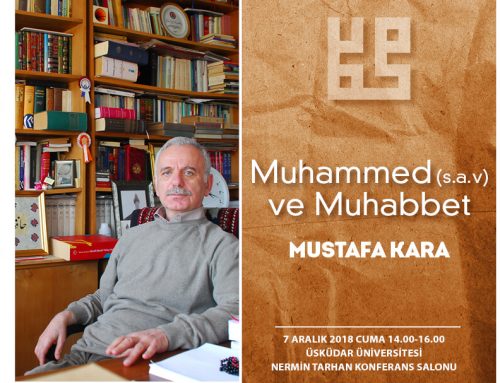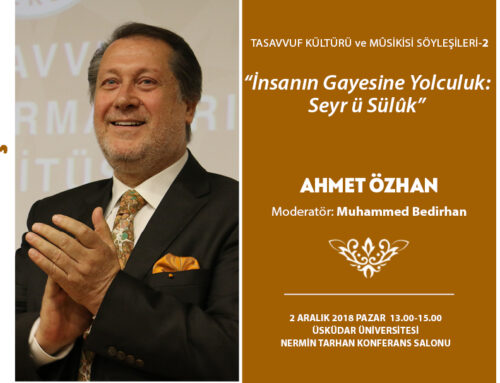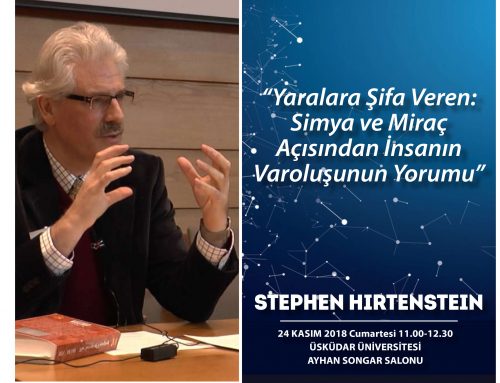Prof. Dr. Kenan Rifai, Director of the Kenan Rifai Center for Sufi Studies, which will serve within Kyoto University. Yasushi Tonaga says that he specifically sends his students to Turkey to study Sufism, adding: “I want to show the true face of Islam through the example of Turkish Islam based on Sufism against Islamophobia.”
With the initiatives of Turkish Women’s Cultural Association (TÜRKKAD) and Kerim Foundation, Kenan Rifai Sufi Research Center was opened at Kyoto University in Japan after the USA and China. Last week, we attended the official opening in Kyoto, Japan. Kyoto University is known for its scientific work and Nobel prizes. The Kenan Rifai Center, which was established within the Islamic Institute Department with the initiative of TÜRKKAD and Kerim Foundation, aims to make its name known to the world with its research on Islamic mysticism within the same university. The director of the Center is Prof. Dr. Dr. K. K., who is a faculty member of the Faculty of Asian and African Studies at Kyoto University and also conducts his research at the Center for Islamic Studies of the same university. Yasushi Tonaga was brought in. Tonaga first sends his students who want to study Islamic mysticism to Turkey. “In order to understand Islamic culture well, it is necessary to know Ottoman sources well,” he explains. Most of the academics attending the ceremony have worked in Turkey and are fluent in Turkish. “If our new center succeeds in informing the general Japanese public about the other side of Islam, namely Islamic Sufism, they will see Islam in a different light and change the current image of Islam,” Tonaga says, adding that they want to explain to the Japanese public that Islam is a religion of peace, not terrorism and violence against Islamophobia. We talked to Tonaga about his Sufi journey, Turkish Sufi studies, the newly opened Kenan Rifai Center and Islamophobia.
Let’s start here first. How did your interest in Sufism begin?
My interest in Sufism started in my first year at university. I was also impressed by a book by Toshihiko Izutsu on Ibn Arabi and his ideology.
Were you influenced by Izutsu and you started to study Ibn Arabi?
Yes.
I WANT TO COMPARE MY BUDDHISM WITH SUFISM
Were you only academically interested or were you also personally interested in Sufism?
Unfortunately, I do not identify myself as a Sufi. I am very interested in Sufi thought, but not only Islamic Sufism, but mysticism in general, all kinds of mysticism known in the world. Professor Izutzu was likewise interested in mysticism in general, especially mysticism in the East, the oriental mysticism. For him, Islam meant Sufism. While doing these studies, he wanted to create his own oriental philosophy under the name of “Izutsu Orientalism”. It was an oriental philosophy that included Taoism, Buddhism, Zen mysticism and various mysticism trends of Buddhism and Indian mysticism and so on. I want to follow his way of thinking as much as possible. In this new center we have opened, I would like to do a study on the comparison of various mysticism trends, not only Sufism, but also Islamic Sufism and Buddhist mysticism, for example.

THE OTTOMAN PERIOD IS VERY IMPORTANT
How did your connection with Turkey begin?
I studied at Cairo University from 1986 to 1988. In the meantime, I came to see Turkey in 1987. At that moment I realized that the Ottoman period was very important for Islamic culture, but I did not know enough about it and decided to research Islamic civilization in the Ottoman period and mysticism in Islam.
How long did you do research in Turkey?
As I mentioned before, I first came to Turkey in 1987. Then I came back in 1991 and then a few more times. I also came back in 2002 and stayed in Üsküdar, Istanbul for six months. Since then, I started to stay in Istanbul for a month every year in the summer.
MANUSCRIPTS SPARKED MY INTEREST IN SUFISM
You used documents for your work. Especially Ottoman texts. How did these contribute to your work?
I first started my research on Islamic civilization with Arabic and Persian. These are important for Turkish culture. I found many manuscripts in the Süleymaniye Library. These were not only in Arabic and Persian, but also included many Ottoman manuscripts. These manuscripts made me want to do research on Sufism.

How did you come up with the idea of opening a Chair of Sufism at Kyoto University?
I am very happy to have opened the Kenan Rifai Center for Sufi Studies at Kyoto University in Japan for Sufi studies. Kyoto University has a long history of studying mysticism, especially Far Eastern mysticism, such as Buddhism, Taoism, and so on. However, new trends in Islamic mysticism are being studied. So I believe that the opening of this Sufi research center at Kyoto University is a very important milestone for Sufi studies in Japan and the Far East.
THE TRUE FACE OF ISLAM MUST BE SHOWN
Will the studies on Islam in this center contribute to preventing Islamophobia in the world? What do you think about that?
There is no extreme Islamophobia in Japan like in Europe or America. But because of terrorism, the Japanese have a very negative view of Islam in general. But I think there are several kinds of Islam. One is radical Islam, which is very terror-oriented. But I think traditional Islam in Turkey is very different from this kind of Islam. And I think this is connected to the tradition of Sufism and tariqa. I want to show the true face of Islam with the example of Turkish Islam based on Sufism. Islamophobia is not very high in Japan. That’s why we are lucky. But the general level of Japanese knowledge about Islam is also very low. So our view of Islam is very biased. Therefore, if our new center can succeed in informing the general Japanese public about the other side of Islam, namely Sufi Islam, they will see Islam in a different light and change the current image of Islam.
When we look at the Middle East, there is war and violence between Islamic countries. Again, recently Islam has become synonymous with ISIS. Do you find it difficult to explain Islam to Japanese people?
This is difficult for us Japanese who specialize in Sufism. It is not easy to explain to the general Japanese public that Islam does not have radicalism or violence at its core. We have many opportunities to talk to these people not only in the university but also in seminars outside the university. We explain to them that Islam is essentially a religion of peace and love and that it is based on Sufism. But one day, right after one of my seminars, there was a bomb incident. So everything I wanted to tell the Japanese people was turned upside down by that terrorist incident. It is a very sad situation, but I believe that we should continue to strive to improve the Japanese people’s view of Islam.

I was the first Japanese to study Sufism in the Ottoman Empire
There are many academics from Japan coming to Turkey. Many of these scholars work on the Ottoman archives in Süleymaniye. But when we look at the two countries, they are very far apart. What do you think is the reason for this interest?
It is true that many Japanese scholars have worked on Ottoman archives and in the Süleymaniye Library. But Japanese academics before me were coming to Istanbul to study Ottoman history. Not to study Islamic thought, especially Sufism. I was probably the first Japanese to do research on this topic in the archives at Suleymaniye, but many young people have followed in my footsteps and are collecting information from the Ottoman manuscripts at Suleymaniye. There is now a growing number of Japanese scholars interested in Ottoman archives on Sufism.
Half of my students are interested in Turkish mysticism
How many students have you trained so far, in which fields of Sufism have they studied?
The school has three postgraduate departments. One of these three departments is our department and there are three departments in this department. One of these departments is Islamic World Studies. We only provide postgraduate education, not undergraduate education. And every year we select only three students for this postgraduate study. So every year I select one or two students for Sufi studies. Some of them are interested in Arab mysticism and some in Iranian mysticism.
You direct more of your students to Turkey, what is the reason for this?
Recently, about half of my students are interested in Turkish Sufism, Ottoman Sufism and Sufism in modern Turkey. We have various programs to send our students to foreign countries. One of these countries in particular is Turkey. For this reason, every year my students are in Turkey for a few months and in some cases even for a year or two. Here they either carry out fieldwork or spend their time in libraries and archives.
Turkish academia has a place above our heads
The Kenan Rifai Institute has been established and you are the head of it. What will be done in this center from now on? What will be its contribution to Islam, its contribution to Sufism?
Before I left for Turkey last summer, I was informed that the Karim Foundation in Japan intended to open a center on Sufism at Kyoto University. In August 2015, I had the opportunity to stay in Istanbul for a month in the summer. At that time, I also had several opportunities to meet with the Kerim Foundation. In one of our meetings, we agreed on the establishment of the center and then we continued our talks. In November 2015, we decided to establish the Kenan Rifai Center for Sufi Studies. That’s when we opened the preparatory office. In March 2016, we invited around 50 distinguished Turkish guests to Kyoto University and held a very exciting opening ceremony for our center.
WE WANT TO BUILD BRIDGES
In the future, I want it to become a center for Sufi studies in Asia and especially in the Far East, southeast Asia, east Asia, etc. We also want our center to serve as a bridge between the Far East and the Middle East. So I would like to send many of my students to Turkey to research Sufism, not only Sufism in modern Turkey, but also Sufism in the Ottoman period. We also welcome Turkish students and academics to come to Kyoto University to give seminars or to study.
http://www.yenisafak.com/hayat/islamofobiyi-tasavvufla-yenecegiz-2432790





